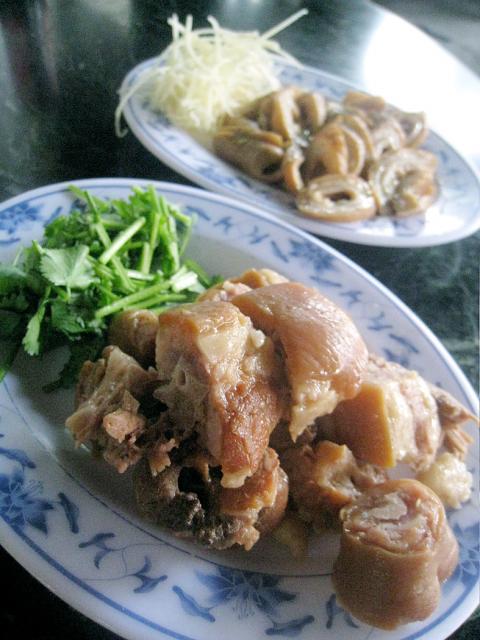One of the great glories of eating in Taiwan is the country’s gaggle of small, ramshackle shops that have survived the explosion in fast-food culture and thumb their noses at convention. The shops and the food they produce may not be particularly sophisticated, but what they do, they do with an assurance derived from decades of experience, and they bring in the punters without making any concessions to modernity.
The restaurant known as Under the Banyan Tree (榕樹下麵店) does not even have a shop sign. It is, in fact, no more than its name suggests: a shack that is built around and under a massive banyan tree in an alley off a parking lot in Hualien City. Its opening hours define it as a breakfast and brunch shop, and the kind of food it offers could be described as a farmer’s breakfast. Noodles, of course, but flavored with side dishes such as pig’s tail, pig’s cheek, blood cake and stewed intestine. It opens at 7:30am and many of its dishes are sold out by lunchtime.
Service is fast and furious, and sometimes a little chaotic. But things get done, and there is much on offer for anyone with a taste for unconventional breakfast food. There are four types of noodles, including yimian (意麵), a Fujian-style flat egg noodle that in Taiwan traces its origins to Tainan, and mitaimu (米苔目), a Hakka-style rice noodle, along with more conventional Taiwanese-style yellow noodles (油麵) and rice vermicelli (米粉). All are topped with highly seasoned pork.

Photo: Ian Bartholomew, Taipei Times
A bowl of well-prepared noodles is a good thing, but what makes Under the Banyan Tree special is its range of side dishes. One of its most popular is its wild chicken (土雞), which is tender and firmly textured at the same time. Some other notable highlights include stewed pig’s tail, a lightly soy-scented serving of what is some of the most tender and flavorsome pork meat you are likely to encounter. There is a good deal of skin, but it is firmer and less oily than that on the trotter, and definitely worth trying.
The head meats are also very well prepared, and the establishment has its own mix of thick soy, coriander leaf and other condiments that makes a very fine accompaniment. Stewed pig’s intestine, a dish that even top-class restaurants can mess up, is a dream come true, and it pairs perfectly with the stewed bamboo shoots. Another difficult dish that the establishment does particularly well is blanched squid, which has a particularly fine texture.
For the budget conscious, it is worth noting that many of the side dishes are sold by weight, with no price on the menu. A local taxi driver told this reviewer that “they” make the prices up as they go along, and given the rather rudimentary order form, there seems to be no way of checking your order. For a table of two, most side dishes are between NT$50 and NT$150.
This absence of clearly marked prices might annoy some, as might the fact that the washing up is done just off the dining area by a woman in pajama trousers and Wellington boots, and the occasional unexplained delays in service, but for its causal curbside ambiance and top quality nosh, a stop under the banyan tree is well worth it.

One of the biggest sore spots in Taiwan’s historical friendship with the US came in 1979 when US president Jimmy Carter broke off formal diplomatic relations with Taiwan’s Republic of China (ROC) government so that the US could establish relations with the People’s Republic of China (PRC). Taiwan’s derecognition came purely at China’s insistence, and the US took the deal. Retired American diplomat John Tkacik, who for almost decade surrounding that schism, from 1974 to 1982, worked in embassies in Taipei and Beijing and at the Taiwan Desk in Washington DC, recently argued in the Taipei Times that “President Carter’s derecognition

This year will go down in the history books. Taiwan faces enormous turmoil and uncertainty in the coming months. Which political parties are in a good position to handle big changes? All of the main parties are beset with challenges. Taking stock, this column examined the Taiwan People’s Party (TPP) (“Huang Kuo-chang’s choking the life out of the TPP,” May 28, page 12), the Democratic Progressive Party (DPP) (“Challenges amid choppy waters for the DPP,” June 14, page 12) and the Chinese Nationalist Party (KMT) (“KMT struggles to seize opportunities as ‘interesting times’ loom,” June 20, page 11). Times like these can

JUNE 30 to JULY 6 After being routed by the Japanese in the bloody battle of Baguashan (八卦山), Hsu Hsiang (徐驤) and a handful of surviving Hakka fighters sped toward Tainan. There, he would meet with Liu Yung-fu (劉永福), leader of the Black Flag Army who had assumed control of the resisting Republic of Formosa after its president and vice-president fled to China. Hsu, who had been fighting non-stop for over two months from Taoyuan to Changhua, was reportedly injured and exhausted. As the story goes, Liu advised that Hsu take shelter in China to recover and regroup, but Hsu steadfastly

You can tell a lot about a generation from the contents of their cool box: nowadays the barbecue ice bucket is likely to be filled with hard seltzers, non-alcoholic beers and fluorescent BuzzBallz — a particular favorite among Gen Z. Two decades ago, it was WKD, Bacardi Breezers and the odd Smirnoff Ice bobbing in a puddle of melted ice. And while nostalgia may have brought back some alcopops, the new wave of ready-to-drink (RTD) options look and taste noticeably different. It is not just the drinks that have changed, but drinking habits too, driven in part by more health-conscious consumers and